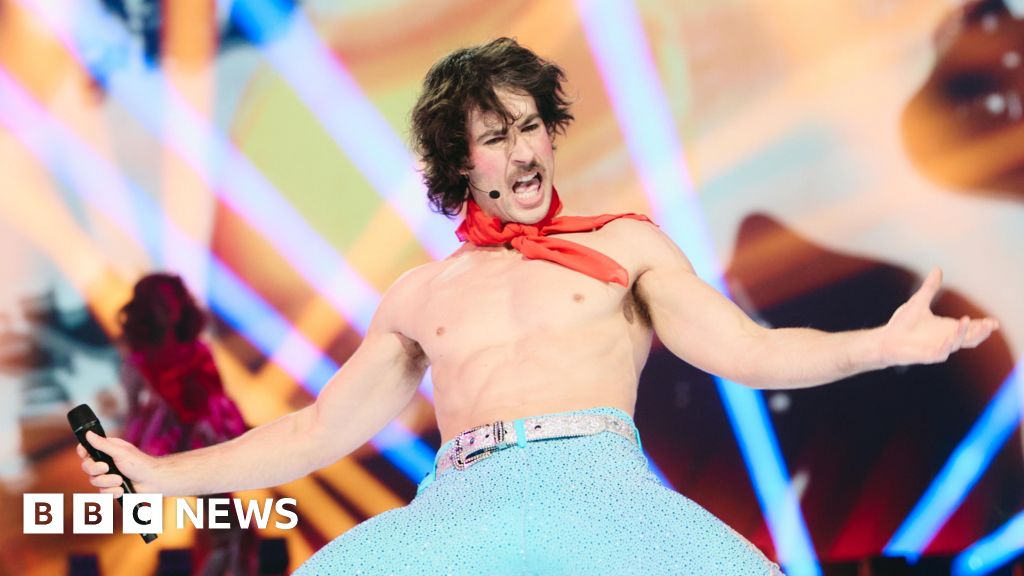Music Correspondent
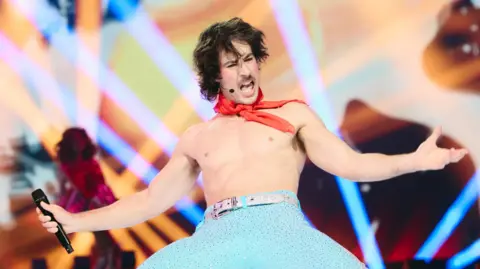 Alma Bengtsson
Alma BengtssonThe 2025 Eurovision Song Contest pops its cork on Sunday, with a “turquoise carpet” parade featuring competitors from all 37 nations.
But the competition really begins on Tuesday, when the first semi-final will see five countries unceremoniously kicked out.
Another six will lose their place at the second semi-final on Thursday, before the Grand Final takes place in Basel, Switzerland, on Saturday, 17 May.
This year’s entrants include two returning contestants, one professional opera singer, a thinly veiled allusion to sexual emissions and a dance anthem about a dead space dog.
It’s a lot to take in.
To help you prepare, here’s a guide to all 37 songs in the contest, which I’ve sorted into rough musical categories, mainly for my own sanity (it didn’t work).
Left-field pop bangers
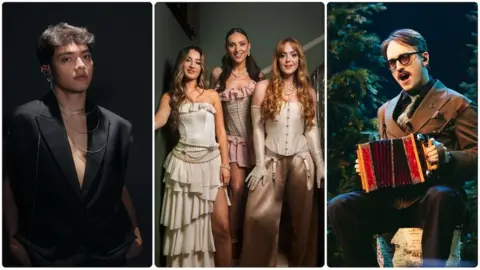 Pavla Hartmanova / BBC / Alma Bengtsson
Pavla Hartmanova / BBC / Alma BengtssonWin or lose, UK contestants Remember Monday have given headline writers a gift with the title of their entry: What The Hell Just Happened?
A souped-up, full throttle pop anthem, it cherry-picks the best bits of Queen, Andrew Lloyd Webber and the Beatles, presumably to remind voters of Britain’s rich musical heritage.
With eight tempo changes, it could prove tricky for voters to grasp, but the band’s stellar harmonies and sparkling personalities should carry them through.
Crucially, the song avoids the Eurovision cliches of jackhammer dance anthems and windswept balladry – something Remember Monday have in common with this year’s favourites.
Sweating it out at the top are Swedish representatives KAJ, whose song Bara Bada Bastu is an ode to the restorative powers of the sauna, complete with dancers in skimpy towels.
Unreasonably catchy, it’s won the approval of Abba’s Bjorn Ulvaeus, whose been singing the track in his own private sauna. As you do.
Stiff competition comes from Austrian singer JJ, and his operatic ballad Wasted Love.
A timeworn story of unrequited love, it leans on his training as a counter-tenor, before exploding into an unexpected techno breakdown.
A favourite with the bookies, the song’s only Achilles heel is its similarity to last year’s winner, Nemo.
Distinctive in a different way is Ireland’s entry, Laika Party – a 90s rave track about a dog who was sent to space by Russia and left to die there.
Singer Emmy aims for a hopeful spin on a tragic story but, despite a peppy performance, it’s a bit of a downer.
More palatable is Luxembourg’s Laura Thorn, whose La Poupée Monte Le Son is a callback to France Gall’s 1965 winning entry, Poupée De Cire, Poupée De Son.
Where the original was about a “fashion doll” operated by songwriter Serge Gainsbourg, Thorn’s response is all about taking control.
“If you think a man like you can manipulate me, go back to your mum,” she scolds. Yeouch.
Other countries sucking up to Italy
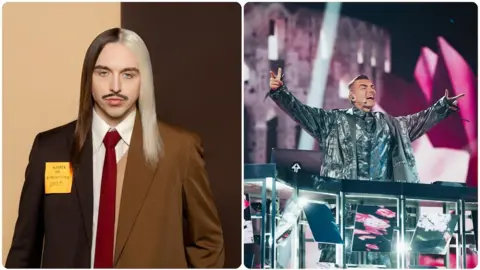 ERR / Sarah Louise Bennett
ERR / Sarah Louise BennettRome must be blushing. This year features not one, but two, songs about the vibrant culture of Il Bel Paese.
The first comes, not surprisingly, from San Marino – the independent microstate that nestles inside north-central Italy.
Titled Tutta L’Italia, it celebrates everything from the county’s football team and its vineyards, to the Mona Lisa (under her Italian name Gioconda).
Written by Gabry Ponte – one of the brains behind Eiffel 65’s Blue (Da Ba Dee) – it’s a slight, but fun, mixture of dance beats, traditional accordion playing and the folk dances of Calabria.
The staging could be its downfall, though, with Gabry marooned behind his DJ decks while the singers, who for some reason wish to remain anonymous, obscure their faces with masks.
More memorable, but definitely more unhinged, is Estonia’s Espresso Macchiato.
Performed by Tommy Cash (the only Eurovision contestant to have appeared on a Charli XCX record) it’s an affectionate-ish caricature of Italian stereotypes, featuring the indelible lyric: “Life is like spaghetti, it’s hard until you make it“.
Smut!
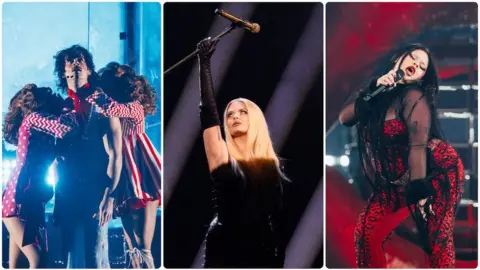 Sarah Louise Bennett / Alma Bengtsson
Sarah Louise Bennett / Alma BengtssonI’m trying to give up sexual innuendo, but Eurovision is making it har… difficult.
A trio of artists are trying to sneak smut past the censors, led by Malta’s Miriana Conte, with a throbbing club track called Serving.
In its original form, the song’s chorus revolved around the phrase “serving kant” – the word kant being Maltese for “singing” and a homophone for an English term that definitely doesn’t mean singing.
It’s a reference to a well-known phrase in the drag / ballroom world; but several countries complained it broke broadcasting guidelines, prompting a hasty re-write.
If the stunt was meant to generate headlines it worked, but now that Miriana has our attention, she’s not letting go.
Her performance, featuring a giant disco ball pursed between two red lips, is gloriously OTT, and she has an enviable set of pipes. Too bad the song is riddled with Europop cliche.
Another contestant doubling his entendres is Australia’s Go-Jo, who wants us to “take a sip” of milkshake from his “special cup”. Interpret that how you want but I’d be wary of hitching a lift in his ice cream van, if I were you.
With a smattering of Electric Six’s saucy disco funk, Milkshake Man is tasty enough to get Australia back in the finals after only achieving a semi last year.
Finally, we have Finland’s Erika Vikman, whose song Ich Komme is billed as a “joyous message of pleasure, ecstasy and a state of trance”.
Structured to mimic the pneumatic realities of lovemaking, it recalls iconic gay anthems such as Kylie’s Your Disco Needs You and Donna Summer’s Hot Stuff – and ends with Erika shooting into the sky astride a massive gold microphone that’s definitely not a stand-in for a phallus.
Three songs inspired by cancer
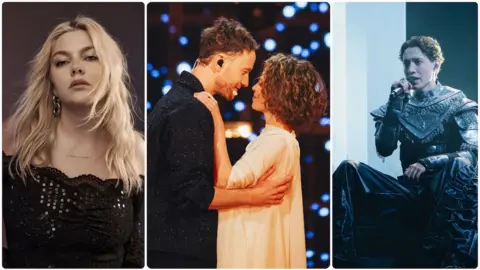 France Télévisions / Sarah Louise Bennett
France Télévisions / Sarah Louise BennettLittle in life is more devastating than the phrase “I’m afraid it’s cancer”.
The disease will affect one in two of us and, although survival rates have dramatically improved, the impact can be devastating.
This year, three separate Eurovision contestants have been touched by cancer, inspiring songs of unmatched heartbreak and reflection.
French singer Louane captures it best. Her song Maman, is an intimate conversation with her mother, who died when she was just 17 years old.
Over three verses, Louane describes the “emptiness” she was felt; and how she filled the void with bad behaviour and meaningless love affairs. But, as the song progresses, she tells her mum she’s settled down and found purpose… by becoming a mother herself.
She sings it beautifully, with a mixture of regret and strength. And when her daughter’s voice appears in the final moments of the song, it would take a steely heart not to shed a tear.
Over in Norway, 19-year-old Kyle Alessandro shared a similar story, when his mother was diagnosed with cancer in autumn 2023. Thankfully, she’s now in remission, but something she said during her treatment inspired his Eurovision entry: “Never lose your light.”
Kyle took that phrase and turned it into a thumping pop song about surviving adversity. “Nothing can burn me now,” he sings. “I’m my own Lighter.”
Klemen Slakonja, meanwhile, is a comedian best known in Slovenia for his impressions of Donald Trump and Vladimir Putin – but his ballad, How Much Time Do We Have Left was written after his wife, actress Mojca Fatur, was diagnosed with bone marrow cancer.
As he sings, Klemen’s dancers raise him into the air and hold him upside down, to represent the disorientation the family felt.
“When she read her diagnosis, our world turned upside down and I felt that rush of blood in my head, the same one I feel whenever I am upside down in the performance,” he told Eurovision World.
Defying the odds, Mojca survived, and joins him on stage at Eurovision. It’s a deeply intimate and moving moment.
The bops
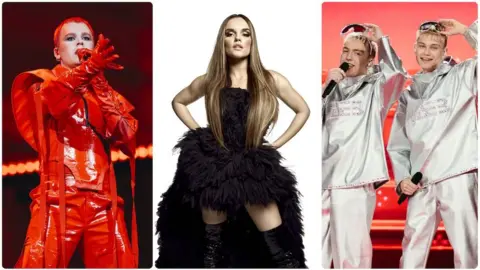 Sarah Louise Bennett / Valero Rioja / Alma Bengtsson
Sarah Louise Bennett / Valero Rioja / Alma BengtssonListening to this year’s line-up, it’s like the contestants all heard Cascada’s Evacuate the Dancefloor and went, “Nah, we’re good, thanks”.
There are club bangers everywhere, with Belgium’s Red Sebastian (named after the crab in The Little Mermaid, bless him) submitting an entire song about the loved-up liberation of an all-night rave.
“Where no words are needed to feel the connection / Where clocks never tick and where love is the ending.”
A favourite with fans, the 90s rave elements of Strobe Lights feel a little dated to me, but his meticulously-choreographed performance is a treat.
Denmark’s Sissal takes a similar sound, with a throwback Euro-bop called Hallucination that effortlessly evokes two-time Eurovision winner Loreen.
Sissal said her biggest goal was for the audience to feel they couldn’t sit down during the song. Mission accomplished.
Germany, meanwhile, have been hoping to reverse their 15-year losing streak with Baller, a super-catchy trance anthem that wouldn’t sound out of place at Berlin superclub Berghain.
Performed by Austrian siblings Abor & Tynna, it’s languishing in the middle of the field, after Tynna developed laryngitis, robbing the duo of the chance to impress fans at Eurovision’s various pre-parties. But now that she’s recovered, the song could rise up the rankings.
That’s less likely for Væb, aka the Icelandic Jedward. Their energetic dance-rap song, Roá, is all about rowing from Iceland to the Faroe Islands, “because no matter what happens in life you just keep on rowing through the waves”.
Sadly, it’s not as deep as it sounds.
Spanish star Melody fares better with Esa Diva, a pumping house track with a sprinkling of flamenco guitar, that documents her journey to fame.
And Azerbaijan’s Mamagama go all Maroon 5 on Run With U, a smooth pop song elevated by a twinkling riff on the saz – a long-necked plucked instrument similar to the lute.
Post-immigrant pop
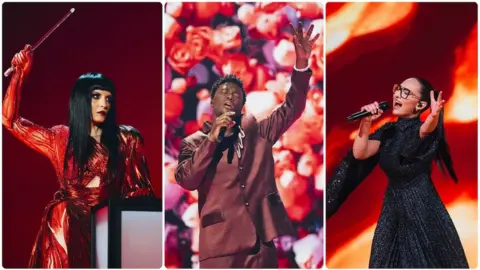 Sarah Louise Bennett / Alma Bengtsson
Sarah Louise Bennett / Alma BengtssonOK, so I’ve stolen that description from Shkodra Elektronike.
They’re an Albanian duo living in Italy, who fuse the ethnic music of their hometown, Shkodër, to a progressive electronic sound.
Their song Zjerm (Fire) imagines a time when cross-cultural understanding would lead to peace and harmony – a world without a need for soldiers and ambulances, and where “oil would smell like lilac” (no, me neither).
Greece’s entry, Asteromáta, is also rooted in history and memory, as Klavdia describes the unbreakable bond that refugees share with their homeland.
“Even if they cross the seas / They shall never forget the sacred earth they called home,” she sings, in a haunting ballad that blends traditional Greek and Pontic elements with soaring strings.
Taking a more upbeat approach is Dutch singer Claude. A refugee from the bloody civil war in the Democratic Republic of Congo, he moved to the Netherlands at the age of nine and fell in love with Eurovision while waiting in the refugee centre.
His song, C’est La Vie, is a tribute to his mum, who taught him to see the positive in their situation.
Fizzing with freedom and joy, it combines elements of chanson and French-Caribbean zouk, and looks set for a top 10 placing.
Witchcraft, sorcery and moody goth boys
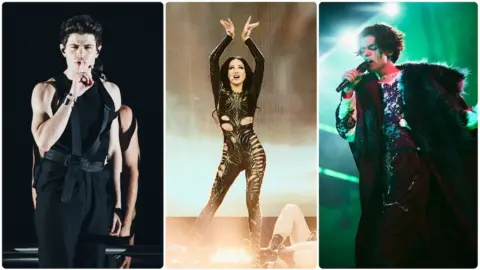 Sarah Louise Bennett / Alma Bengtsson
Sarah Louise Bennett / Alma BengtssonThe success of “goth gremlin witch” Bambie Thug at last year’s Eurovision has conjured a veritable coven of imitators in 2025.
Polish singer Justyna Steczkowska, representing her country for the second time, even includes a Slavic magic spell in her song, Gaja – summoning the spirit of the mother Earth to “cleanse” her of a toxic relationship.
It’s a suitably intense performance, with Justyna singing long sustained notes and playing a furious violin solo, before being hoiked into the rafters on a pair ropes.
What a time to be alive.
Marko Bošnjak, meanwhile, is cooking up a Poison Cake to feed to his tormentors – chiefly the people who bombarded him with homophobic hate messages after he was selected to represent Croatia.
The criticism was so intense that he lost his voice and couldn’t leave the house for five days.
His song is suitably melodramatic, replete with guttural synths and creepy playground chants. It’s a little overbaked, but should still sail through to the finals.
Taking a more ethereal approach are Latvian group Tautumeitas, whose song Bur Man Laimi translates as “a chant for happiness”.
Reminiscent of Bjork and Enya, its overlapping folk harmonies are based on traditional Latvian wedding songs, making it one of this year’s most captivating entries. I fear it may be too subtle to score well, though.
Further mystery is provided by, Theo Evan, Cyprus’s answer to Nick Jonas. The lyrics to his song, Shh, are a riddle, written by former tennis player Elke Tiel, whose “hidden truth will only be revealed on the Eurovision stage in May”.
He opens his performance perched between two pieces of scaffolding in a recreation of Leonardo da Vinci’s famous Vitruvian Man sketch – so there’s a clue.
Shh is one of a number of gothic pop songs, sung by brooding young men with interesting hair.
Among the best is Kiss Kiss Goodbye, by Czechia’s Adonxs, who divebombs from an angelic falsetto to an unsettling baritone as he confronts his absent father.
Lithuanian band Katarsis are an interesting experiment, with a deliberately downbeat rock song that declares “the foundations of everything have begun to rot”.
Titled Tavo Akys (your eyes), it builds to a compelling climax, but it’s hard to see it being a vote-winner, unless Eurovision suddenly attracts an audience of depressed emo teens.
Rounding out the field are Armenian singer Parg, with the Imagine Dragons-inspired Survivor and Serbia’s Princ, whose overwrought ballad is called Mila.
Both performers give it their all, but the songs don’t feel strong enough to survive the semi-finals.
70s rock throwbacks
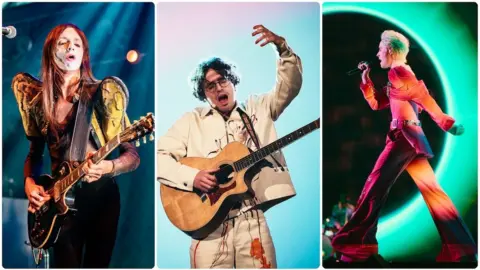 Getty Images / Alma Bengtsson
Getty Images / Alma BengtssonFour years after Måneskin’s victory, Eurovision’s rock revival continues apace.
Italy are back at it again, thanks to Lucio Corsi – think David Bowie as Pierrot – and his glam rock ballad Volevo Essere Un Duro (I wanted to be tough).
A delicate anthem for people who feel they don’t fit in, it recalls how Lucio was bullied as a kid, and how he’s grown to embrace his fragility. At one point, he sings: “Instead of a star, [I’m] just a sneeze.”
It’s a timeless bit of songwriting that pulls off that crucial Eurovision trick of sounding new and familiar all at once.
Portuguese indie band Napa also have a 70s vibe, channelling Paul McCartney’s Wings on the soft rock tear-jerker Deslocado (out of place).
It’s another song about migration, written after the band were forced to relocate from Madeira to the Portuguese mainland due to the economic crisis.
“Even though we’ve been here for a few years we always have that desire to go back, and that anguish of saying goodbye to family,” said singer Guilherme Gomes.
Last but not least are Ukraine’s Ziferblat, who continue the country’s astonishing run of high-quality entries in the midst of a war with Russia.
Their song, Bird Of Pray, is an unexpected mix of 70s new wave band Cars, birdsong and the guitar riff from Rachel Stevens’ Sweet Dreams My LA Ex – while the lyrics are full of hope for a peaceful reunion with their loved ones.
It’s better than that makes it sound.
The ballads
 Shai Franco / Sarah Louise Bennett / Maurice Haas
Shai Franco / Sarah Louise Bennett / Maurice HaasWhere would Eurovision be without a raven-haired woman bellowing into a wind machine set to “hurricane”?
Israel has strong form in this category, and sets the bar again with New Day Will Rise, a melancholy piano ballad sung in a mixture of English, French and Hebrew.
The song’s performed by Yuval Raphael, a 24-year-old who narrowly escaped with her life at the 2023 Nova music festival, where an attack by Hamas claimed the lives of 378 people and triggered Israel’s ongoing offensive in Gaza.
It’s hard not to interpret her lyrics as a response to those events – “everyone cries, don’t cry alone”. As a result, her participation hasn’t received the same level of criticism as Eden Golan, who represented Israel last year.
That can’t be said for Georgia’s contestant, Mariam Shengelia, who has been booed during pre-Eurovision appearances for her alleged support of the country’s authoritarian, pro-Russian, anti-LGBT ruling party, Georgian Dream.
Shengelia has denied the accusations, pointing out that her song – a stirring, quasi-militaristic ballad called Freedom – is about “freedom of choice, freedom to love, freedom to live as you want to live”.
“No amount of manufactured hate will change that,” she told the Eurovision fan site Wiwibloggs.
Montenegro’s Nina Žižić tackles domestic abuse in Dobrodošli, a brooding and refined orchestral ballad.
The singer, who previously entered Eurovision in 2015 with the cyborg pop oddity Igranka, delivers her lyrics with passion and sincerity, but somehow the song never quite takes off.
Last but not least, we have defending champions Switzerland, represented by 24-year-old Zoë Më, who describes herself as a “little fairy”.
Appropriately enough, her self-penned song, Voyage is delicate as a fairy’s wings, fluttering with a soft-spoken plea to treat each other with kindness.
Automatically qualifying for the final, it’s a welcome oasis of calm amidst the steamy sauna sessions, moody goth haircuts and thrusting innuendo.
But that’s Eurovision for you. All human life is here. See you in Basel!
